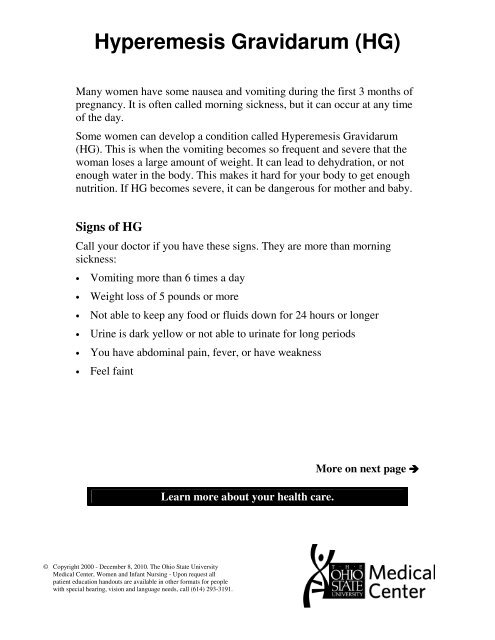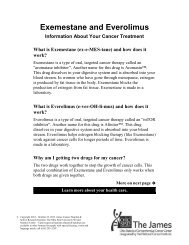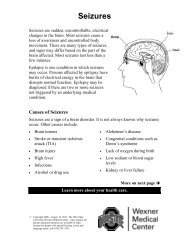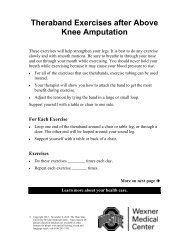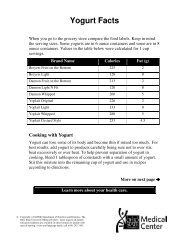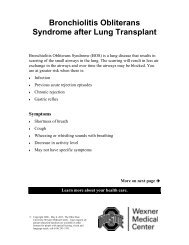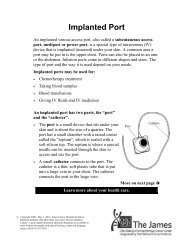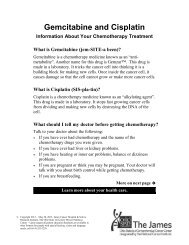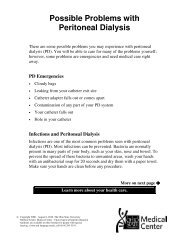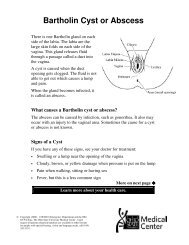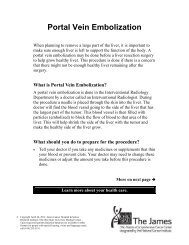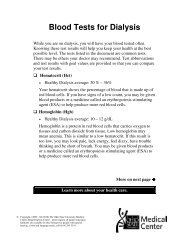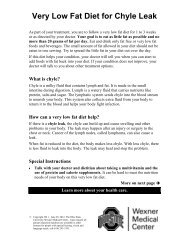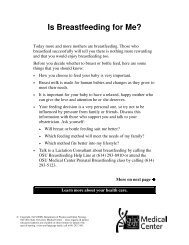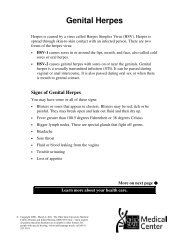Hyperemesis Gravidarum (HG) - Patient Education Home
Hyperemesis Gravidarum (HG) - Patient Education Home
Hyperemesis Gravidarum (HG) - Patient Education Home
Create successful ePaper yourself
Turn your PDF publications into a flip-book with our unique Google optimized e-Paper software.
<strong>Hyperemesis</strong> <strong>Gravidarum</strong> (<strong>HG</strong>)<br />
Many women have some nausea and vomiting during the first 3 months of<br />
pregnancy. It is often called morning sickness, but it can occur at any time<br />
of the day.<br />
Some women can develop a condition called <strong>Hyperemesis</strong> <strong>Gravidarum</strong><br />
(<strong>HG</strong>). This is when the vomiting becomes so frequent and severe that the<br />
woman loses a large amount of weight. It can lead to dehydration, or not<br />
enough water in the body. This makes it hard for your body to get enough<br />
nutrition. If <strong>HG</strong> becomes severe, it can be dangerous for mother and baby.<br />
Signs of <strong>HG</strong><br />
Call your doctor if you have these signs. They are more than morning<br />
sickness:<br />
• Vomiting more than 6 times a day<br />
• Weight loss of 5 pounds or more<br />
• Not able to keep any food or fluids down for 24 hours or longer<br />
• Urine is dark yellow or not able to urinate for long periods<br />
• You have abdominal pain, fever, or have weakness<br />
• Feel faint<br />
© Copyright 2000 - December 8, 2010. The Ohio State University<br />
Medical Center, Women and Infant Nursing - Upon request all<br />
patient education handouts are available in other formats for people<br />
with special hearing, vision and language needs, call (614) 293-3191.<br />
Learn more about your health care.<br />
More on next page
Page 2<br />
Treatment for <strong>HG</strong><br />
Your doctor may try several treatments to help your condition:<br />
Dietary Changes<br />
• Eat small meals often to avoid an empty stomach. Eat dry crackers,<br />
toast, or cereal before getting out of bed or when feeling queasy or<br />
nauseated.<br />
• Wait at least 15 to 30 minutes after eating before drinking fluids. Take<br />
sips of clear liquids only. Examples of clear liquids are clear fruit juices<br />
(apple, pear, white grape), weak tea, soft drinks like Sprite, 7-UP or<br />
ginger ale, and broth. Try low sugar or no sugar type drinks such as<br />
Gatorade or Powerade Zero.<br />
• Eat foods that are easy to digest such as bread, toast, plain crackers, dry<br />
Cheerios or other dry, low sugar cereals, or bagels. Try gluten-free<br />
options, such as Rice Chex.<br />
• Avoid greasy or spicy foods. Try bland foods until nausea gets better.<br />
• Avoid strong food smells that can trigger nausea.<br />
• After 2 or 3 days with little or no vomiting, follow the <strong>Hyperemesis</strong><br />
Diet (Dry Diet) handout for more food choices.<br />
Food Diary<br />
Keep a diary of when vomiting occurs, such as certain foods, odors,<br />
activities, or places. The goal is to find anything that triggers the nausea.<br />
Share this information with your doctor and care team.<br />
Medical Treatment<br />
• If severe dehydration occurs, intravenous fluids (by vein) may need to<br />
be given through a tube into your vein called an IV.<br />
• Most doctors avoid giving medicines during pregnancy. However, in<br />
this situation, the risk of using medicines is less than the risk of poor<br />
nutrition and weight loss from <strong>HG</strong>. These medicines may be used to<br />
help you. Please talk with your doctor, nurse, and pharmacists about<br />
questions you may have using these medicines.
Page 3<br />
Over-the-counter medicines (purchased without a prescription): For<br />
all medicines, take as directed. Do not take more than the dose<br />
listed on the package.<br />
• Medicines for nausea and motion sickness (Antihistamines):<br />
Doxylamine (Unisom ® ) or Diphenhydramine (Benadryl ® )<br />
Dimenhydrinate (Dramamine ® )<br />
Meclizine (Bonine ® , Antivert ® )<br />
• Vitamins:<br />
Pyridoxime (Vitamin B6)<br />
Prenatal or multivitamin<br />
Calcium supplement<br />
Prescription Medicines: For all medicines, take as directed. Do not<br />
take more than the dose listed on the package or as prescribed.<br />
• Medicines to treat nausea and vomiting (Phenothiazines):<br />
Prochlorperazine (Compazine ® )<br />
Promethazine (Phenergan ® )<br />
• Medicines to increase movement of food from the stomach to the<br />
intestines:<br />
Metoclopramide (Reglan ® )<br />
• Medicines to decrease stomach acid production and treat reflux, or<br />
movement of stomach contents backwards into esophagus:<br />
Ranitidine (Zantac ® )<br />
Famotidine (Pepcid ® )<br />
Pantoprazole (Protonix ® )<br />
Lansoprazole (Prevacid ® )<br />
Omeprazole (Prilosec ® )<br />
Medicine pumps: If you have been hospitalized for <strong>HG</strong>, you may<br />
have a pump for one week to one month after discharge.<br />
• You may have care from a home health nurse to monitor your condition.<br />
• You may have follow up phone calls for your care.<br />
Talk to your doctor or others on your health care team if you have<br />
questions. You may request more written information from the<br />
Library for Health Information at (614) 293-3707 or email: healthinfo@osu.edu.


